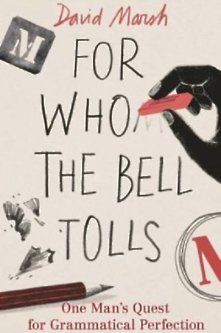
David Marsh

"Grammar" and "glamour" come from the same word, but you would hardly know it. I wanted to show that grammar, which has long been regarded as dull, could be fun. Many, perhaps most, people say their English language lessons at school were boring and that they have forgotten most of what they learned. I wanted to write a guide to the basics that they would actually enjoy reading, while learning from it at the same time. Most books about grammar are written by people who know too much about it (academics) or too little about it (journalists and the like). The former find it hard to explain the subject to non-specialists; the latter often make up for their lack of knowledge by insulting their readers, calling them “semi-literate” or worse, and concentrating on relatively unimportant issues such as whether or not you are allowed to split an infinitive. (You are.)
When I was commissioned to write a "quirky grammar book", I jumped at the chance. As a journalist who has actually studied the subject (I have a master's in English language from UCL), I thought I would have a try at writing a book that would be accessible to the reader from the standpoint of someone who knows a bit about it.
Why are you so passionate about grammar?
As a senior editor on a national newspaper, my job is about communicating clearly to the readers, and an understanding of grammar helps you to do that. It's not about thinking you are better than other people because you know what a gerund is; it's about knowing how to get your point across. And in spite of the way some grammar books make it sound complicated, it's not that difficult.
How much have emails and mobile phones affected our use of correct grammar?
In his book "Txtng: The Gr8 Db8" the linguist David Crystal demonstrates how all the offences against English of which texters are routinely accused have been commonplace and acceptable in the language for centuries. The language is rich in initialisms: AKA, DVD, NB and RIP, for example. Omission of letters is common, too: in texting, “2nite”, perhaps; in more formal use, Mr and Mrs. Rebuses like B4 and CUL8R have also been around for hundreds of years, and nonstandard spellings such as “wot” (1829) and “luv” (1898) date from the 19th century. Finally, shortened words commonly found in text messages – uni, for example – are no different from bus, exam, vet and numerous similar examples.
Language styles adopted by young people have always been criticised by the older generation. What you find is that older people gradually adopt the new styles, and suddenly there is no problem. “LOL” was once regarded as an abuse of language by young social media users. Now the prime minister uses it. (Although he thinks it means “lots of love”, rather than “laughing out loud”.)
Why is grammar still something that people struggle with even after education?
I think some people worry too much about what someone once taught them they shouldn't do – don't split infinitives, don't start a sentence with a conjunction, don't end a sentence with a preposition, don't use "who" rather than "whom" – but many of these traditional "rules" have no real basis and you can cheerfully ignore them. I concentrate on the rules that really do make a difference, for instance where to put a comma in "let's eat, Grandma!" (you have gone round to your granny's for tea) and "let's eat Grandma!" (your granny is on the menu).
I also believe that you can make grammar easier to learn if you make it fun. I advise people who want to learn about personal pronouns to watch De La Soul's video for "Me, Myself and I" on YouTube: it's a great song, and it tells you everything you need to know about the difference between subject, object and reflexive pronouns. if young people realised that you can learn as much about syntax from Dr Dre as you can from Dr Johnson, they'd be much more enthusiastic about English language lessons.
Who is the book aimed at?
People who learned about grammar at school but have forgotten what they learned; people who were never taught it; people who are interested in the subject and would like to know how you can use language more effectively – whether you are writing a tweet, a Facebook update, an essay, an email, or a love letter.
To what extent do songs abuse grammar?
I don't think they do. Most songs use colloquial or informal language, which is perfectly grammatical and acceptable – you wouldn't expect a song to be written in the same formal style as, say, a job application. When I was young the older generation wittered on about the "yeah, yeah, yeah" in "She Loves You" and predicted we would all grow up not knowing how to say "yes" any more. The same people thought Mick Jagger should sing "I Can't Get Any Satisfaction", which would have made him sound like a twerp.
Please can you tell us a bit about your background?
I've been a journalist for nearly 40 years – from the Kent Messenger to the Redditch Indicator, from the Sun to the Financial Times, from the South China Morning Post to the Independent; among other things I have been a ballet critic, lonely hearts correspondent, pop music columnist, football writer, and restaurant reviewer. I joined the Guardian in 1996 and I'm now the production editor. I edit a blog called Mind your language (theguardian.com/mindyourlanguage) and a Twitter feed with 46,000 followers (@guardianstyle). I live in Berkshire with my wife, Anna, our two-year-old son, Freddie, and our very stylish dog, Lupin.
8. What is next for you?
I am debating "Questions of grammar" at Kings Place in London on 25 January with NM Gwynne, the author of "Gwynne's Grammar", who takes a very different, much more traditional, approach to the subject (http://www.kingsplace.co.uk/whats-on-book-tickets/spoken-word/grammar-0#.UrMlI78yDlf) and a month later, on 25 February, I am presenting a Guardian Masterclass, "How to use grammar", also at Kings Place (http://www.theguardian.com/guardian-masterclasses/how-to-use-grammar-david-marsh-writing-course).
I'd like to write another book but that depends on the publishers and Freddie!
"For Who the Bell Tolls: One Man's Quest for Grammatical Perfection" is published by Guardian Faber.

